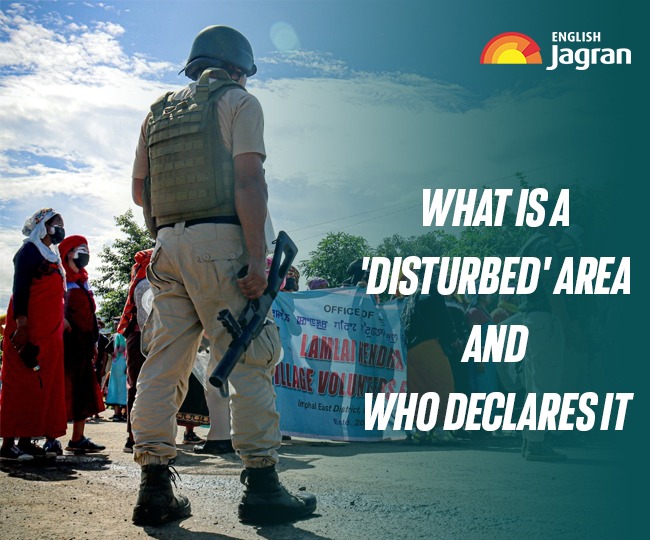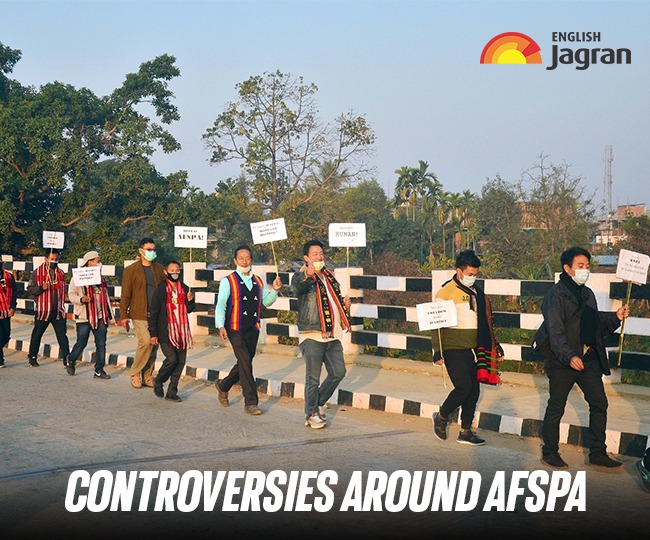- By Vivek Raj
- Thu, 28 Sep 2023 06:54 AM (IST)
- Source:JND
The Manipur government on Wednesday declared the entire state a 'disturbed area' under the Armed Forces Special Powers Act (AFSPA) for a six-month period, except in areas under the jurisdictions of 19 police stations, including the capital Imphal.
This decision comes in response to the prevailing law and order situation, following the killing of two Metei community students, which sparked massive protests in Imphal. Notably, AFSPA has also been extended in Arunachal Pradesh and Nagaland for an additional six months by the Central government.
What Is AFSPA?
The Armed Forces Special Powers Act (AFSPA) is a parliamentary act that grants special powers to the Indian Armed Forces, state, and paramilitary forces in areas classified as 'disturbed areas'. The primary objective of AFSPA is to maintain law and order in such areas. It empowers these forces to take stringent measures, including shoot-to-kill, house searches, and property destruction when dealing with insurgencies or militancy.
Key Provisions Of AFSPA
- The Governor of a State and the Central Government can declare any part or the entire state as a 'disturbed area' if they believe it's necessary to counter terrorist activities or threats to India's sovereignty, national flag, anthem, or the Constitution.
- Section (3) of AFSPA allows the Central government to deploy armed forces to assist civilian authorities when a region is officially declared 'disturbed.' This declaration must be published in The Gazette of India.
- The status of being a 'disturbed area' must be maintained for a minimum of three months, as per The Disturbed Areas Act of 1976.
- Section (4) grants special powers to Army officers in disturbed areas, allowing them to use force, including lethal force, against individuals suspected of violating the law. A warning is required before opening fire. This includes situations involving the assembly of five or more people and the carrying of weapons.
- Security forces have the authority to arrest individuals without a warrant and conduct searches without obtaining consent.
- Individuals taken into custody must be handed over to the nearest police station as soon as possible.
- Prior permission from the Central Government is required for the prosecution of officers on duty for alleged violations of human rights.
Historical Background of AFSPA
AFSPA has its origins in the British colonial government's Armed Forces Special Powers Ordinance during the Quit India movement. It was initially invoked in Assam in 1947 to address internal security challenges stemming from the Partition.
The Armed Forces (Assam and Manipur) Special Powers Act, 1958, was enacted to deal with uprisings in the Naga Hills and neighbouring areas. The Act was later replaced by AFSPA for broader application, including in Jammu and Kashmir, in 1990.
Declaration of 'Disturbed Areas' under AFSPA

A 'disturbed area' is officially declared through notification under Section 3 of AFSPA. Such areas can result from disputes between different religious, racial, linguistic, or regional groups. The power to declare an area as disturbed lies with the Central Government, the Governor of the State, or the administrator of the Union Territory, who can issue notifications in the Official Gazette.
The Ministry of Home Affairs usually enforces AFSPA, but exceptions exist where the decision is left to State governments.
States Under AFSPA
Several states in India have come under the purview of AFSPA at different times, including Jammu and Kashmir, Assam, Manipur, Nagaland, Meghalaya and Arunachal Pradesh.
Controversy Surrounding AFSPA
While AFSPA is seen as a necessary tool to combat insurgency and militancy, it has faced significant controversy and criticism.

Violates Human Rights: Critics argue that AFSPA fails to protect and uphold human rights, citing cases of alleged custodial rape and killings.
Misuse of Absolute Power: The act grants absolute authority to armed forces, allowing them to shoot on sight based on suspicion, potentially violating the right to life.
Violates Fundamental Rights: The power of arbitrary arrest and detention provided by AFSPA contradicts Article 22, which provides safeguards for preventive and punitive detentions.
Immunity Against Punitive Action: AFSPA grants immunity to armed forces, making it difficult to hold them accountable for their actions, leading to concerns about potential abuse of power.
The absolute power granted to armed forces, including the authority to shoot on sight based on mere suspicion, is viewed as a violation of the fundamental right to life. The immunity against punitive action for armed forces' actions has been a subject of considerable controversy, as it can lead to unchecked decision-making.
